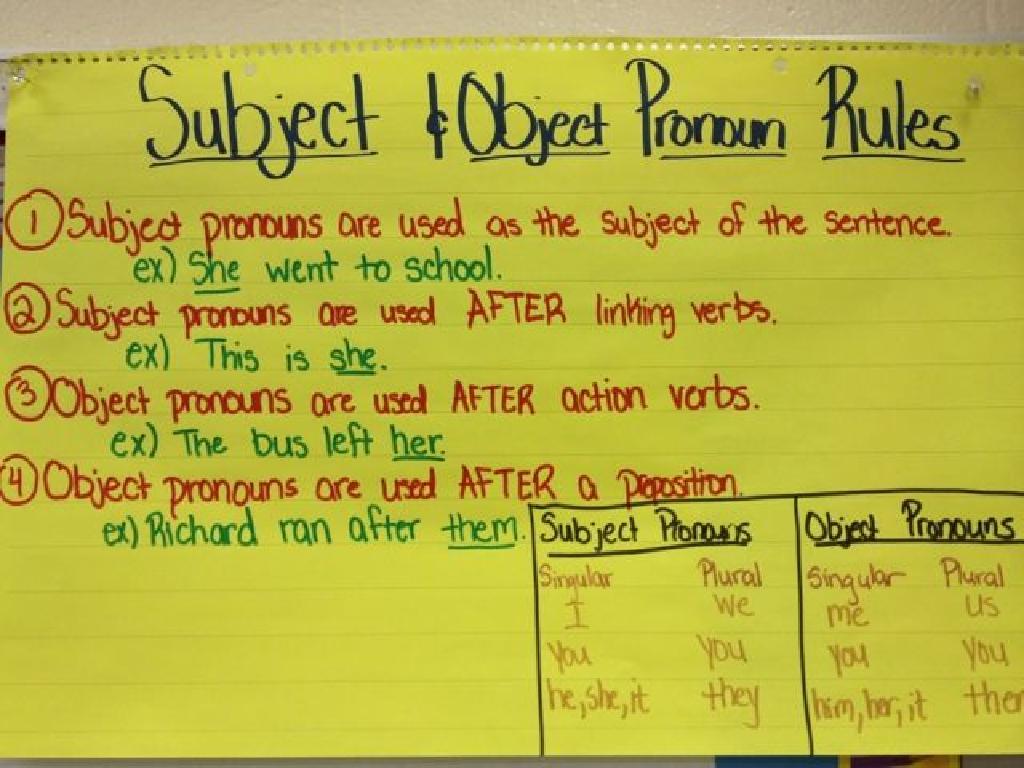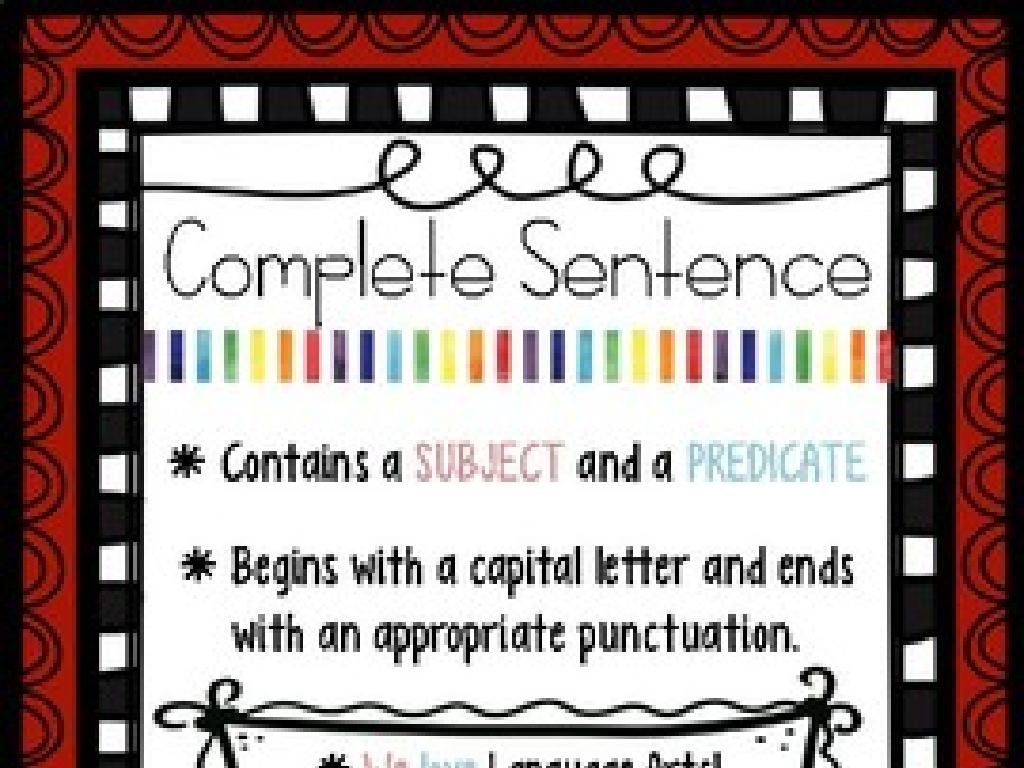Source Analysis: The Gettysburg Address
Subject: Social studies
Grade: Eighth grade
Topic: The Civil War
Please LOG IN to download the presentation. Access is available to registered users only.
View More Content
Introduction to Source Analysis: The Gettysburg Address
– Importance of historical documents
Historical documents give insight into the past.
– Defining Source Analysis
Source Analysis is examining documents to understand history.
– Significance of the Gettysburg Address
The Address is key to Civil War & American history.
– Analyzing the Address
We’ll explore its meaning and impact in society.
|
This slide introduces the concept of source analysis, a critical skill in social studies that involves examining historical documents to gain a deeper understanding of the past. Emphasize the importance of such analysis in uncovering the perspectives and context of the time period. The Gettysburg Address, delivered by President Abraham Lincoln during the Civil War, is a significant artifact for its eloquent expression of the war’s purpose and its vision for national unity. Students will learn to analyze the Address not only for its content but also for its broader impact on American history and identity. Encourage students to think critically about the document’s language and how it reflects the historical context of the Civil War era.
Context of the Gettysburg Address
– Overview of the Civil War
– A conflict between North and South over various issues, including slavery.
– Significance of Gettysburg Battle
– The battle was a pivotal victory for the Union, marking a turning point.
– Lincoln’s wartime leadership
– As president, Lincoln led the nation and aimed to preserve the Union.
– Gettysburg Address impact
– The speech redefined the purpose of the war and the nation’s values.
|
This slide provides the historical context necessary to understand the significance of the Gettysburg Address. Begin with a brief summary of the Civil War, highlighting the key issues at stake, such as states’ rights and slavery. Emphasize the Battle of Gettysburg as a crucial Union victory that shifted the war’s momentum. Discuss Abraham Lincoln’s leadership during this period, focusing on his dedication to keeping the country united. Conclude with the enduring impact of the Gettysburg Address, how it honored the fallen soldiers, and its role in redefining the war’s purpose to include a strong message of human equality and the preservation of democracy. Encourage students to reflect on how the Address still resonates with American values today.
Exploring the Gettysburg Address
– Read the Gettysburg Address aloud
– Discuss key themes and messages
– Themes of equality, sacrifice, and nationhood
– Analyze Lincoln’s language use
– Examine powerful diction and concise phrasing
– Understand rhetoric’s impact
– How rhetoric shapes perception of the speech
|
This slide aims to engage students in an interactive reading and analysis of the Gettysburg Address. Begin by reading the speech together to help students familiarize themselves with the text. Follow with a discussion on the central themes such as the importance of human equality, the sacrifices made during the Civil War, and the concept of a united nation. Analyze Abraham Lincoln’s use of language, focusing on his choice of words and how his succinct yet powerful phrasing contributes to the lasting impact of the speech. Lastly, delve into the role of rhetoric and how it influences the audience’s understanding and emotional response to the Address. Encourage students to think critically about the historical context of the speech and its relevance today. Provide examples of modern rhetoric for comparison.
Analyzing the Gettysburg Address
– Identify persuasive techniques
– Look for ethos, pathos, and logos used by Lincoln
– Grasp the speech’s historical context
– Understand the Civil War backdrop of the address
– Explore the speech’s national impact
– Discuss how it shaped national identity and unity
|
This slide aims to delve into the Gettysburg Address and understand its significance in American history. Students should identify rhetorical strategies such as ethos (credibility), pathos (emotional appeal), and logos (logical argument) that President Lincoln used to persuade his audience. It’s crucial to comprehend the context of the Civil War and how the speech aimed to heal a divided nation. Discuss the lasting impact of the speech on American identity and how it helped to redefine the nation’s values and goals. Encourage students to think critically about the effectiveness of Lincoln’s words and how they continue to resonate in American society.
Comparing Perspectives on the Gettysburg Address
– Diverse interpretations initially
– Unionists saw hope, Confederates saw defiance
– Reactions at the time of the speech
– Mixed reviews: some praised, some criticized
– Modern views of the Address
– Seen as a symbol of democracy and freedom
– The Address’s enduring legacy
– Continues to inspire and teach values
|
This slide aims to explore how the Gettysburg Address was received differently by various groups at the time of its delivery and how it is regarded today. Initially, the speech was interpreted through the lens of a divided nation, with Union supporters finding hope and Confederate sympathizers perceiving it as a challenge. Contemporary reactions were mixed, with some newspapers and individuals praising Lincoln’s words, while others dismissed them. In modern times, the Gettysburg Address has come to be celebrated as a profound statement of American ideals, particularly democracy and freedom. Its legacy persists, serving as a touchstone for discussions on national identity and civic values. Encourage students to consider how historical context shapes the understanding of such speeches and to reflect on why the Gettysburg Address remains relevant in today’s society.
Class Activity: Analyzing the Gettysburg Address
– Break into groups for speech analysis
– Each group analyzes a speech segment
– Focus on language, tone, and message of your assigned part
– Present your group’s analysis
– Share insights on the significance and impact of the segment
– Class discussion on interpretations
– Compare different viewpoints and historical context
|
This activity is designed to engage students with the Gettysburg Address through collaborative analysis. Divide the class into small groups, assigning each a different portion of the speech to examine closely. Encourage students to consider the language used, the tone of the speech, and the overall message conveyed by President Lincoln. After the group work, each group will present their findings to the class, fostering a deeper understanding through peer teaching. Conclude with a class discussion to explore the various interpretations and understandings, emphasizing the importance of perspective in historical analysis. This will help students appreciate the speech’s historical significance and its relevance to the Civil War. Possible activities include: role-playing different historical figures’ reactions to the speech, creating visual representations of the speech’s main points, or writing a modern version of the speech reflecting today’s societal values.
Reflecting on the Gettysburg Address
– Insights from the Gettysburg Address
– Explored themes of equality, sacrifice, and democracy.
– Value of studying historical speeches
– Understanding context, rhetoric, and impact on society.
– Applying analysis to other documents
– Critical thinking and comprehension skills enhance learning of history.
|
This slide aims to consolidate the students’ understanding of the Gettysburg Address and to reflect on the broader skills they’ve gained through source analysis. Discuss the key themes of the Gettysburg Address, such as the emphasis on human equality, the honoring of those who sacrificed during the Civil War, and the preservation of democracy. Highlight the importance of studying historical speeches to gain insight into the past, the leaders’ intentions, and the impact on the nation’s direction. Encourage students to think about how the analytical skills they’ve used can be applied to other historical documents, enhancing their critical thinking and comprehension. This reflection will help them appreciate the relevance of history in today’s world and their own ability to engage with complex texts.
Homework: The Gettysburg Address’s Modern Relevance
– Essay on Gettysburg Address significance
– Include three lesson’s analytical points
– Analyze how the Address influences current events and ideals
– Understand due date and guidelines
– Check syllabus for submission format and deadline
– Reflect on Address’s enduring impact
– Consider its role in modern civil rights and equality discussions
|
This homework assignment aims to deepen students’ understanding of the Gettysburg Address by connecting it to contemporary issues. Students should reflect on how the themes of unity, democracy, and human equality presented in Lincoln’s speech are still relevant and influential today. Encourage them to think critically about the Address’s role in current civil rights discussions and political rhetoric. Provide clear instructions on the essay’s expected structure, length, and how to submit it, as outlined in the syllabus. Remind students of the due date and offer support for those who may need help with their essays. This activity will help students develop their analytical writing skills and their ability to connect historical events to the present day.






